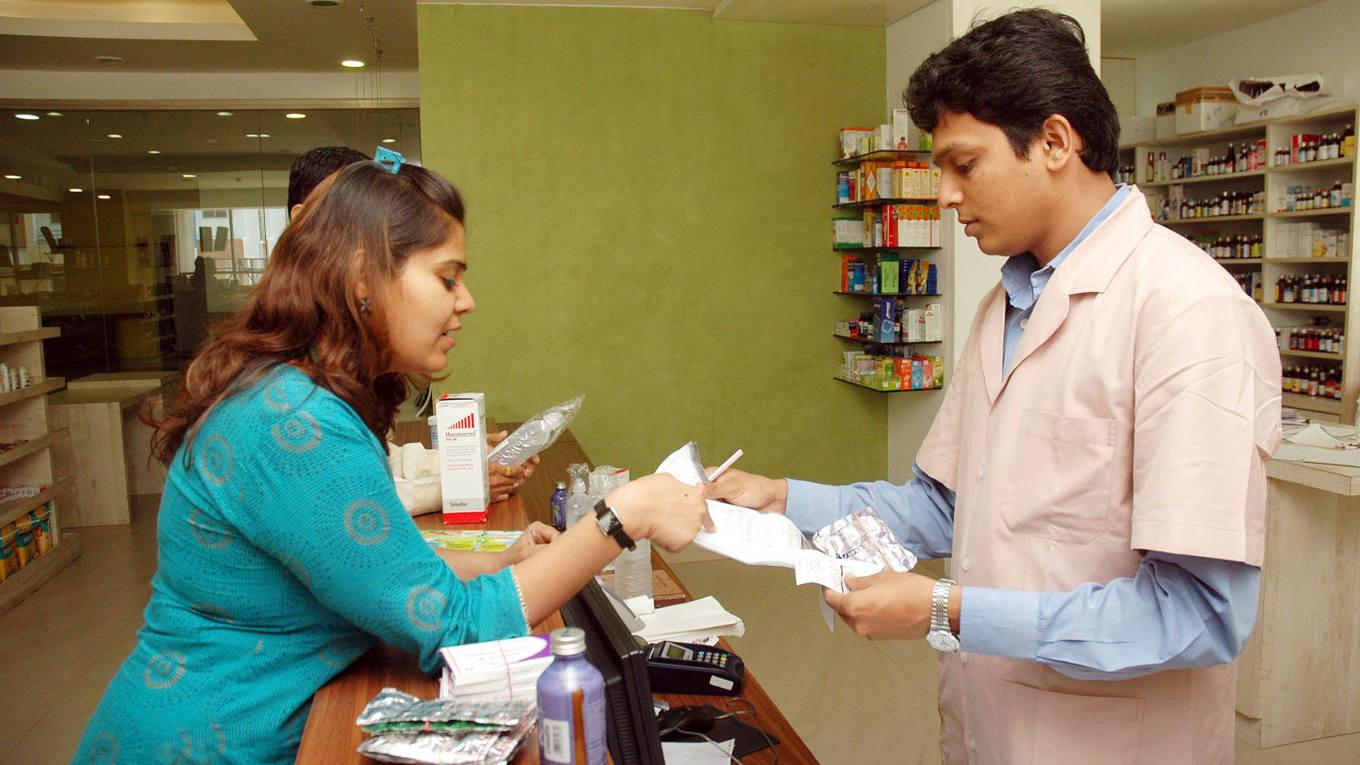-

Basu: both can collaborate to create an efficient supply chain
“There is an urgent need to nurture this promising sector with the right set of policy frameworks and guidelines in order to provide the benefits that the sector fosters for the consumers. We at FICCI believe that with the right regulatory clarity and e-pharmacy Establishment and Practice Guidelines, this sector will attract many entrepreneurs for investment and unleash innovations across the healthcare value chain while dramatically improving access to medicines and healthcare across the nation,” says Dilip Chenoy, secretary general, FICCI.
With these changes and developments in place, Reliance Retail has also now decided to take a plunge in the online pharmacy space which is currently just 2-3 per cent of the $20 billion pharma retail market in the country. While the overall market has been growing at around 12 per cent, the online segment of the business has grown at a CAGR of over 70-80 per cent in the last 4-5 years and this momentum is expected to be maintained going ahead as well. According to Frost & Sullivan, the e-pharmacy market is estimated to reach $3.7 billion by 2022.
Reliance Retail has picked up majority stake in Chennai-based Dadha Pharma-promoted Netmeds for a cash consideration of around Rs620 crore. The Dadha family’s pharmaceutical experience dates back to 1914, when they ventured first into the pharma retailing business and then into drug manufacturing in 1972.
“This investment is aligned with our commitment to provide digital access for everyone in India. The addition of Netmeds enhances Reliance Retail’s ability to provide good quality and affordable healthcare products and services, and also broadens its digital commerce proposition to include most daily essential needs of consumers,” says Isha Ambani, director, Reliance Retail Ventures. “It is indeed a proud moment for Netmeds to join the Reliance family and work together to make quality healthcare affordable and accessible to every Indian. With the combined strength of the group’s digital, retail and tech platforms, we will strive to create more value for everyone in the ecosystem, while providing a superior omni-channel experience to consumers. In the coming years, we will cover many more cities, serve many more customers, expand to many more categories and work to fulfil the ‘Make in India’ dream,” says Pradeep Dadha, founder & CEO, Netmeds.com.
-
The Dadha family’s pharmaceutical experience dates back to 1914, when they ventured first into the pharma retailing business and then into drug manufacturing in 1972
The e-pharmacy space business has witnessed a lot of action in the recent few weeks. Prior to the Reliance deal, Amazon launched its ‘Amazon Pharmacy’ in Bengaluru and will conduct pilots in other cities as well, even as there is a buzz in the market that soon Walmart-owned Flipkart is also looking to foray in the space. Earlier, online medical store PharmEasy agreed to merge with smaller rival Medlife and the combined entity could be valued at around $1.2 billion. “The e-pharmacy space in India is currently in the consolidation phase. The M&A spree started in 2019 with Medlife acquiring Myra. This is just the beginning as many more mergers, acquisitions, and investments likely to happen in the next few quarters. Amazon Pharmacy’s expansion strategy in India is going to be something to watch out for. It is important to note that Amazon made PillPack synonymous with online pharmacy in the US within two years. In the US, Amazon Pharmacy targets chronic disease patients and delivers medicines to their doorstep, which has also increased medication adherence in the country,” says Sowmya Rajagopalan, director, Transformational Health Practice, Frost & Sullivan.
Concerns raised
Meanwhile, All India Organisation of Chemists and Druggists (AIOCD), the apex trade and industry body representing 8,50,000-odd offline chemists and druggists from across the country, has once again strongly opposed the proliferation of online pharmacies in the country on the grounds that it can pose danger to patients’ safety due to self-medication as also the rampant misuse of prescription drugs through online sales.
AIOCD has been expressing its resentment to the government for some time now and urging the government to amend the draft uniform guidelines under Drugs and Cosmetics (D&C) Act to regulate the e-pharmacy space. The government has already prepared a draft guidelines and put them under deliberation before notifying the same. The Union health ministry released draft rules on the sale of drugs by e-pharmacies in August 2018. The association has put out its grievances before the government and urged the government to ban the e-pharmacy activities in the country.
Now AIOCD has sent out letters to Jeff Bezos, global CEO of Amazon and Mukesh Ambani, chairman, RIL saying that the e-pharmacy business in the country is currently not compliant to the existing legal framework and hence reputed companies like Reliance and Amazon should not promote or be a part of this business in the country. Under the current form of e-pharmacy business, there is violation of various provisions of the D&C Act which governs and regulates the manufacturing and distribution of pharmaceutical products in the country.
-

Tandon: e-pharmacies can play a big role
In its communiqué to Bezos as also Amit Agarwal, CEO Amazon India, AIOCD says that the sale and dispensation of medicines in India is covered under the D&C Act 1940 and Rules 1945. The above Act regulates the import, manufacture and distribution of drugs whereas the rules contain classification of drugs and guidelines for storage, display, sale and prescription of each schedule. The mainstay of the rules under this Act is on prescription and procedure of dispensation. A prescription, in original, is required for every “prescription drug” being sold. The rules also specify that the prescription for certain drugs needs to be endorsed while sale. Further, the dispensation has to take place from a licensed premise for which the licence has been issued by the competent authority.
“Therefore, sale of prescription drugs and medicines through online medium is illegal. The legal regime does not permit home delivery of medicines, though recently owing to the situation of Covid-19 pandemic and an emergency like situation, the government allowed the home delivery of medicines but it was meant for only neighbourhood pharmacies. It may be noted that allowing dispensation of medicines by home delivery will require extensive modification to the D&C Act also apart from the rules and the same has been accepted by the Union of India in its affidavit before the High Court of Madras,” says the letter signed by J.S. Shinde, president, and Rajiv Singhal, general secretary, AIOCD.
“The Union of India has admitted on affidavit that allowing the online sale of drugs and prescription medicines requires not only an amendment in Drugs and Cosmetic Rules, but also in the Pharmacy Act, 1948; Pharmacy Practice Regulations, 2015; Indian Medical Act, 1956 and Code of Ethics Regulations, 2002, and Drugs and Magic Remedies (Objectionable Advertisement) Act, 1954,” adds the latter.
AIOCD has also pointed out that a report by a sub-committee constituted by the Drug Consultative Committee was brought out on 30 September, 2016 which looked into the sale of medicines over the Internet in India. The sub-committee in the report was of the view that the sale of medicines over Internet is not possible under the present scenario and a full overhaul of system is needed including establishing a national portal for dispensation by e-prescription.
The sub-committee, according to the apex pharma retail body, also took into consideration the procedures followed in various countries and none of that is similar to the present system of operation of e-pharmacies in India which dispenses on the basis of a scanned or snapshot of prescription. It also suggested the only way for dispensation will be by licensed chemists in the premises itself and not to home deliver.
-
AIOCD has expressed its reservation on the FICCI white paper on e-pharmacies, which analyses the growth, potential and challenges of this new and innovative channel of sale of medicines
In a letter written to Ambani, the trade and industry association says: “AIOCD is an association of about 8,50,000 medicine resellers including retail chemists and pharmaceutical distributors, serving needy patients and working for their bread and butter across India. Including dependent total goes to 58.5 million families and ancillary supporting services total goes to more than 31 million people. This is the scale of the employment our trade generates.”
“It is very disheartening to see that a company of Reliance Industries’ stature, has invested in an industry which is still illegal and not recognised under the D&C Act under which the import, manufacture, sale and distribution of drugs is regulated. Recently, when Amazon.in ventured in the business of online pharmacy, we have written them a letter mentioning all points to prove the above. We have provided all government documents to substantiate our claim,” adds the letter.
“We have been making representations to the government and relevant authorities, raising our concerns about the way the online retail business is shaping up. There are several discrepancies existing in the draft guidelines. The proposed guidelines in the current form will pose ethical, legal and quality challenges amounting to endangering life of many citizens and thereby causing irreparable harm to the society. We will vehemently oppose all the moves which are against our interest,” states Singhal.
However, the e-pharmacies believe that their activities are fully in compliant with the existing rules and regulations and they will continue to follow any guidelines which are progressive in nature. “All the orders on online platforms work with brick and mortar stores which are absolutely compliant under the current law of the land. Especially in this situation (Covid-19) where people should stay indoors, online platforms will enable retailers to connect with customers and deliver medicines at home. As a country, we need to have a progressive outlook and keep moving ahead with the time using technology and ensure healthcare delivery in the country improves with time,” says Dharmil Sheth, co-founder, Pharmeasy.
Committed to support
While vehemently opposing the introduction of e-pharmacies in the country, AIOCD has also expressed its reservation on the FICCI white paper on e-pharmacies, which analyses the growth, potential and challenges of this new and innovative channel of sale of medicines.
While enumerating the achievements of the e-pharmacies during the Corona crisis, the report says: “The e-pharmacy sector through active partnership with existing pharmacies, is firmly committed to support the government and help the nation in fighting Covid-19. The industry is working 24×7 to ensure that people get essential medicines at home all across the country, and the reach of existing pharmacies are expanded. Importantly, regular medicines required for ongoing treatment are also being delivered.”
-

Wellness Forever has supplemented its efforts with online presence as well
It further states that the Covid-19 pandemic has clearly shown the importance of technology and digital infrastructure for providing access to affordable and quality medicines and healthcare services to the consumers across the country. Thus, it is important for the government to encourage and boost the sector by removing the regulatory uncertainties; the most important step in this direction is the urgent notification of e-pharmacy rules. Delay of any policy decisions, like notification of e-pharmacy rules, will hamper the goal of universal health care.
“Along with offline stores, e-pharmacies can play a big role in creating an efficient supply chain for the pharma retail business and thus create a robust retail landscape where both demand and supply side achieve their goals in a more effective manner. Adoption of technology is imperative in this dynamic market place where consumers are becoming more discerning. Besides, it will also address the challenges of affordability, accessibility and transparency in a big way,” says Prashant Tandon, president, DHP (Digital Health Platforms) -- an association of e-pharmacies of India and co-founder and CEO of 1mg, India’s largest digital health platform.
Last year, the Gurugram-based healthtech platform raised $70 million in Series D funding round led by IFC and Corisol Holdings, a European family office and the largest shareholder in Zur Rose/DocMorris (Europe’s largest e-pharmacy). The round also saw participation from a consortium of venture capital funds from South Korea, led by Redwood Global – Korea Omega Healthcare fund. 1mg’s existing investors Sequoia Capital, Omidyar Network, Maverick Ventures, Kae Capital, and HBM Healthcare investments also participated in this round of funding.
-

Singhal: the guidelines pose challenges
Experts are of the view that both offline pharmacies and e-pharmacies can very well co-exist in this market. In fact, the existence of both physical and digital infrastructure will benefit the consumers significantly. Access to both online and offline pharmacies provides consumers with options to choose between any of these channels according to their location, requirements, availability, and price. This is validated from how consumers have shown inclination towards both channels recently, depending on their chronic vs acute use case. While e-pharmacies have been able to reach more chronic users, offline pharmacies are preferred more for acute usage.
More transparency
The e-pharmacy model will enable existing pharmacies to start online operations and serve a broader set of customers. It can also lead to a network of pharmacies integrating into one platform and accessing a broader customer base while ensuring that the inventory is consolidated. This would reduce working capital requirements, remove wastage from system and increase margins. In short, it will facilitate better purchasing margins, better inventory management, increased reach, reduced prices and greater provision of value-added services to customers. Besides, as suggested by the Competition Commission of India, presence of e-pharmacy in the market will likely to stimulate more transparency and price competition in pharmacy market, thereby making medicines more affordable for end-consumers.
“No doubt there is need for technological advancement of retail pharmacy sector to address the challenges in this sector. While it helps in making the sector more efficient and robust, it will also bring down the cost of medicines thus benefiting the end-consumer. In my view both Mumbai-based and online pharmacies can collaborate towards creating an efficient supply chain to co-drive the value for consumers,” says Kingshuk Basu, president of Mumbai-based pharmacy chain, Wellness Forever, which like other branded offline pharma retail chains such as Noble and Apollo Pharmacy, has supplemented its efforts with online presence as well. In other words, these branded offline pharmacies, backed by digital efforts have created a hyper-local presence to service customers in a best possible manner.
All said and done, e-pharmacies are going to be a significant play in the domestic pharma retail market. The entry of these online players will certainly change the overall retail landscape going forward. This will help the market to organise and thus create an efficient supply chain. With the introduction of technology and competition, the efficiency of the entire market will go up significantly. We have already seen a similar transformation happening in the overall retail landscape where the emergence of modern retail and e-commerce players in the last decade or so, has been a big boon for almost all the stakeholders. Moreover, we have also seen co-existence of smaller kirana stores with some minor tweaking.
Similarly, our offline pharma retailers (over 90 per cent are in the unorganised space) can also stay in co-existence. In fact, there is a need for a greater degree of partnership and collaboration among themselves as also with their online counterparts. Both the parties can leverage each other’s resources and competencies and create an efficient market place where consumers have become very discerning and seeking something more than the sheer product. ♦






































